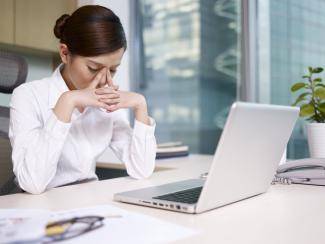
Do the preparation task first. Then listen to the audio and do the exercises.
Preparation
Transcript
Henry: I'd like to thank you both for coming along today. Pam, this is your new book: Taking the blues out of work: How to deal with work-related health problems.
Pam: Yes.
Henry: And Steve, you've just recovered from work burnout, one of the most serious – and common – work-related problems, yes?
Steve: Yes, that's right. I'm in the book! Pam used me as a case study.
Pam: Yes. Steve came along to my clinic for help. He had a serious case of burnout. He followed a course of therapy and …
Steve: … and she helped me to get my health back again.
Henry: Well, that's great. It's good to hear there's a happy ending. Pam, could you tell us what work burnout actually is? Aren't we just talking about stress here? Is there a difference?
Pam: Yes, there is a difference! A very big difference. But that's a good question because most people make the mistake of thinking that burnout is just another word for stress – so I'll start with that. Everyone understands stress. We live in a world where stress is part of our everyday lives. Burnout can be the result of too much stress, but it isn't the same thing. I once heard somebody say that if stress is like drowning in an overload of work, burnout is more like being all dried up. With stress we lose our energy, with burnout we lose much more – our motivation, our hope. And one very important difference between stress and burnout is that we know when we are stressed, but we don't usually realise we are suffering from burnout …
Henry: … until it's too late.
Pam: Exactly.
Henry: Steve, how did you know that your problem was more serious than just being stressed?
Steve: Well, I didn't realise myself. Other people realised first. I changed my behaviour and started feeling really negative and cynical about everything. That wasn't me at all. I've always been a happy-go-lucky sort of bloke. It got to the point where I felt so hopeless and depressed that I couldn't even face getting up in the morning. My wife made me an appointment with the doctor. He was helpful and referred me to Pam.
Pam: Steve was lucky to have the support of his family and friends. It's difficult to get better on your own. It's important to do normal things – exercise, socialise, go for a walk, meet a friend for a coffee …
Henry: And did Steve need medication?
Steve: No.
Pam: We decided to try with everything else first. Medication can be effective – anti-depressants aren't the same these days as they used to be – but Steve got better without any. In fact, it was something he felt quite strongly about.
Steve: I don't even like taking an aspirin unless I really have to, so I think I made a real effort to listen to Pam and do the things she suggested. I even started meditating!
Henry: Meditating?
Pam: Yes, it can really help. It calms the mind and helps to shut out the world's distractions.
Henry: And how are you now, Steve?
Steve: I feel great. Better than I have for years.
Henry: Well, I'm glad to hear it. Now let's talk a bit about … (fade out)




This podcast is very useful, We are learning about work fatigue nowadays, many people have to face fatigue at work. That is something we must be able to handle so that it does not happen in our lives
Hello, I'm Juna, It is true That is the effect of fatigue
This podcast is really useful.
Nowadays, many people have to deal with burnout at work. It is something that really needs to be addressed.
I am glad I don't have this problem!!! However, it is still interesting to hear. It is an interesting experience for me who has not faced this situation.
English is cool anjay, even though I don't understand English at all, but I have a feeling I'm saying good.
I think it's good enough listening practice. Assignments of moderate difficulty, appropriate to the level indicated. And about burnout, perhaps the conversation above can tell you that not everyone knows that they are already in a burnout state, and meditation is one of the solutions to cure burnout.
Thank you so much for the podcast.
Hello everyone,
It is such an interesting podcast. I have relised that I often suffer from burn out after 1 working year. In every company or position I work in, I used to be motivated and energertic at the beggining and lose hope gradually :(((
I need to find the way to help myself. Pratice mediation, go for a walk, write diary, learn new thing, etc. Thanks you so much, authors.
Halo
Thank you for sharing your thoughts. It sounds like you're experiencing something that many people experience. Fatigue can be really comforting, especially if it seems to occur consistently after a certain period of time. The fact that you recognize this pattern is a great first step!
Walking: Regular exercise, including walks, can significantly boost your mood and energy levels. It's a great way to clear your head during a busy workday.
Very interesting article! Personally, I believe burnout it's a real problem, and the first step to deal with it, is to recognize that it's real and it can affect us and the people around us, like family and friends.
Good enough listening practice. Assignments of moderate difficulty, appropriate to the level indicated. The audio is of good quality, so I didn't have to think about what it says. I would recommend it to friends and acquaintances who are also studying English.